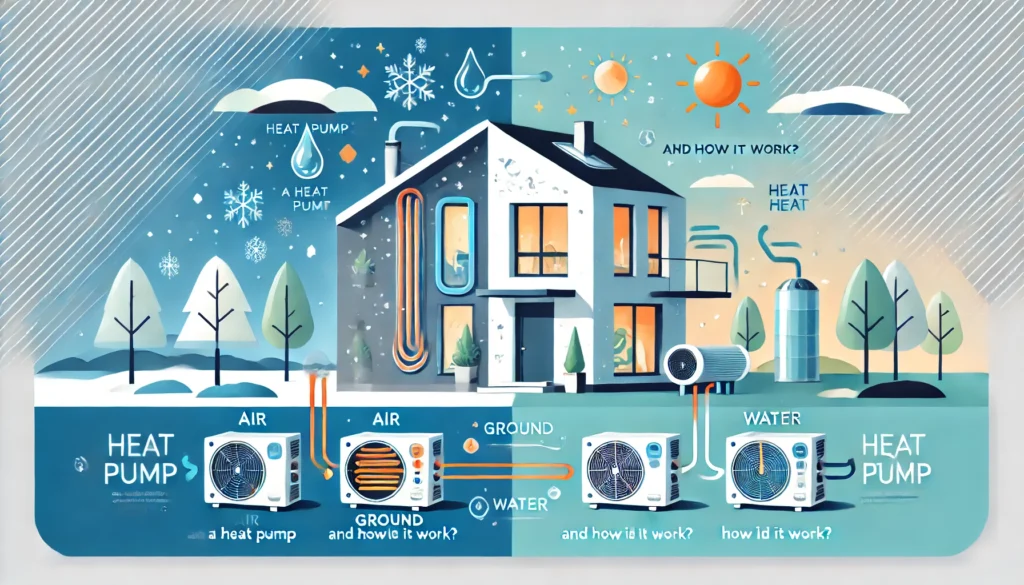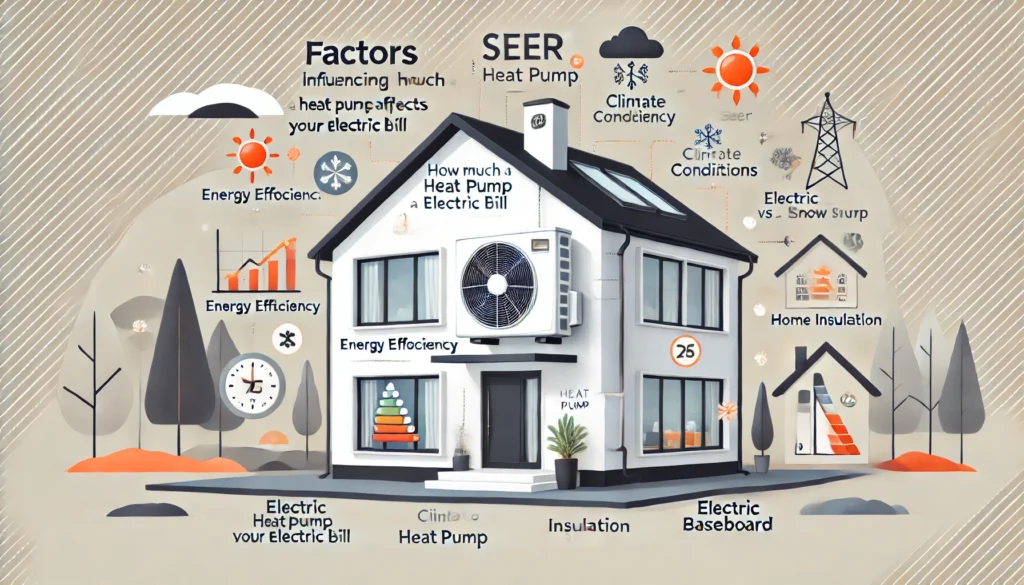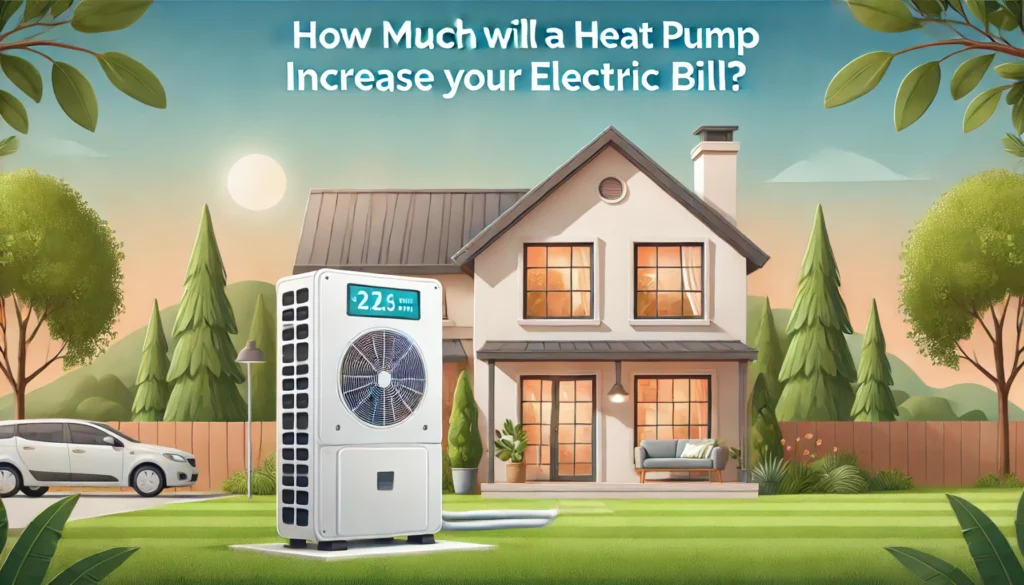Heat pumps are increasingly popular as an energy-efficient alternative to traditional heating and cooling systems. They are valued for their ability to provide both heating and cooling using less energy than conventional HVAC systems.
However, one common concern for homeowners considering a heat pump is its impact on their electric bill. Understanding how much a heat pump will increase (or decrease) your electric bill requires a thorough look at various factors, from energy efficiency to your home’s climate and insulation.
This article delves into the details of heat pump energy consumption and its influence on electricity costs. By the end, you’ll have a clear understanding of what to expect when installing a heat pump.
Table of Contents
What Is a Heat Pump and How Does It Work?
Overview of Heat Pump Technology
A heat pump is an energy-efficient device that transfers heat to generate heating or cooling. Unlike traditional heating systems like furnaces that burn fuel to create heat, a heat pump moves heat from one place to another.
In winter, it extracts heat from the outdoor air, ground, or water and transfers it indoors. In summer, it reverses the process, removing heat from inside the home to cool it down.
Types of Heat Pumps
There are three main types of heat pumps, each with unique energy consumption characteristics:
Air-Source Heat Pumps (ASHPs)
Air-source heat pumps (ASHPs) are a popular choice for heating and cooling homes. They extract heat from the air outside, even on cold days, and transfer it into your home. In warmer months, they reverse the process, removing heat from your home and releasing it outdoors.
This makes them a cost-effective solution for year-round climate control. ASHPs are a reliable and environmentally friendly option for many homes.
Ground-Source Heat Pumps (GSHPs)
GSHPs are a type of heat pump that harnesses the heat from the ground to heat your home in winter and cool it in summer. Unlike traditional air-source heat pumps, which extract heat from the outside air, GSHPs utilize a system of pipes buried in the ground to access the stable temperature of the earth.
This makes them highly energy-efficient and reliable, even in extreme weather conditions. While GSHPs offer long-term energy savings, they typically have higher upfront costs due to the installation of the underground piping system. However, government incentives and lower energy bills can offset these costs over time.
Water-Source Heat Pumps
Water-source heat pumps utilize water as a heat source or sink, making them a highly efficient option. These systems extract heat from water sources like lakes or ponds during colder months and release excess heat into the same source during warmer months.
While less common than air-source heat pumps, water-source systems offer superior efficiency and consistent performance, particularly in regions with ample water sources. However, their effectiveness can be location-dependent, as they require access to suitable water bodies.

Factors Influencing How Much a Heat Pump Affects Your Electric Bill
1. Energy Efficiency of the Heat Pump
High-efficiency models of heat pumps offer significant savings on electricity bills, especially for those in regions with moderate climates. The Seasonal Energy Efficiency Ratio (SEER) and Heating Season Performance Factor (HSPF) are key metrics indicating a unit’s cooling efficiency and heating efficiency, respectively.
A higher SEER rating means lower cooling costs during summer months, while a higher HSPF rating translates to reduced heating costs in winter. By opting for heat pumps with superior efficiency ratings, homeowners can substantially lower their overall heating and cooling costs.
2. Climate Conditions
Heat pumps perform best in moderate climates where temperatures aren’t excessively hot or cold. In these conditions, they can efficiently heat and cool your home, minimizing electricity usage. However, in extreme cold or extreme heat, their efficiency can decline.
This may necessitate the use of supplemental electric heating or cooling, increasing your electricity bill. Additionally, the technology used in a heat pump can significantly impact its performance in different colder climates.
Newer, more advanced models are often better equipped to handle harsher weather conditions.
3. Home Size and Insulation
Home size and insulation play a crucial role in determining how much a heat pump affects your electricity costs. Poorly insulated homes can lead to significant energy loss, forcing your heat pump to work harder to maintain a comfortable temperature.
This increased workload translates to higher electricity consumption and, consequently, a larger electric bill. Conversely, well-insulated homes with energy-efficient windows can significantly reduce the strain on your heat pump, resulting in lower energy consumption and reduced electricity costs.
4. Previous Heating/Cooling Systems
The electric bill impact of a heat pump can be significantly influenced by the type of heating and cooling systems you’re replacing. If you’re upgrading from electric baseboard heaters, you’ll likely experience a noticeable decrease in electricity consumption and, consequently, a lower electricity bill.
However, if you’re switching from a natural gas or oil furnace, the savings might be less dramatic, especially in regions with relatively low local fuel prices.
In these cases, the energy costs associated with the heat pump might be comparable to or even higher than those of traditional systems, particularly during peak usage periods when electricity prices are elevated.

Estimating the Cost Increase: A Practical Example
Let’s assume a mid-sized home (2,000 sq. ft.) in a moderate climate.
Energy Consumption of a Heat Pump
A modern air-source heat pump consumes about 2,000–4,000 kWh annually for heating and cooling. For comparison:
- Electric Furnace: Consumes around 10,000–15,000 kWh per year.
- Central AC with Gas Furnace: AC consumes about 1,000–1,500 kWh, while the furnace uses gas.
Electric Bill Calculation
Suppose the local electricity rate is $0.13 per kWh. If a heat pump consumes 3,000 kWh annually:
- Heat Pump Costs: 3,000 kWh×0.13 $/kWh=390 $/year3,000 \, \text{kWh} \times 0.13 \, \text{\$/kWh} = 390 \, \text{\$/year}3,000kWh×0.13$/kWh=390$/year.
If you previously used a gas furnace and a central AC, the additional electricity for the heat pump might add $250–$350 annually to your bill. However, savings from reduced gas or oil consumption might offset this.
How to Minimize Electric Bill Increases
1. Choose a High-Efficiency Model
Energy efficiency is key to reducing your electric bill. When considering a new heating and cooling system, look for models with high SEER and HSPF ratings. These ratings measure the efficiency of air conditioners and heat pumps, respectively.
A higher rating means lower energy consumption and, consequently, lower bills. Additionally, look for the ENERGY STAR label, which signifies products that meet strict energy efficiency guidelines.
2. Optimize Home Insulation
Air leaks are the silent energy vampires of your home. Seal them up to prevent heat loss in winter and cool air escape in summer. Insulation is your home’s thermal blanket, keeping your interior cozy and reducing your energy consumption.
Prioritize areas like attics, basements, and crawl spaces. Don’t forget about your windows, as they can be significant sources of heat gain or loss. By optimizing your home’s insulation, you’ll not only save on your electric bill but also enhance your overall comfort.
3. Utilize Smart Thermostats
Smart thermostats are your secret weapon to combat rising energy costs. These intelligent devices allow you to program your heating and cooling systems to adjust temperatures based on your occupancy and weather patterns.
By optimizing your home’s climate control, you can significantly reduce energy consumption without sacrificing comfort.
4. Take Advantage of Off-Peak Hours
To minimize your electric bill, consider taking advantage of off-peak hours. Many utilities offer lower rates during these times, typically late at night or early in the morning.
By scheduling energy-intensive tasks like laundry and dishwashing during these periods, you can significantly reduce your usage and save money. Additionally, if you have a heat pump, setting it to operate during off-peak hours can help lower your overall costs.
5. Regular Maintenance
Regular maintenance is crucial for ensuring your HVAC system operates efficiently and reduces energy consumption. Filters should be changed regularly to maintain optimal airflow. Dirty filters restrict airflow, forcing your system to work harder, leading to increased energy usage.
Additionally, scheduling maintenance checks can help identify and address potential issues like low refrigerant levels in heat pumps. By proactively addressing these factors, you can significantly minimize your electric bill.
Check similar Guide: What Makes People Switch from Heat Pumps to Baseboard Heaters?
Final Thoughts: Is a Heat Pump Worth It?
While a heat pump can indeed increase your electric bill, it’s important to consider the bigger picture. Many variables influence the extent of this increase, including your climate, home size, insulation, and the specific system you choose.
A high-efficiency model can significantly reduce the impact on your electric bill. Additionally, by implementing smart energy management practices and optimizing your home’s energy efficiency, you can further minimize the increase in your electricity usage.
Ultimately, a heat pump can be a worthwhile investment that offers year-round comfort and environmental benefits. By carefully considering these factors, you can make an informed decision that suits your specific needs and contributes to a more sustainable future.
Frequently Asked Questions
What is a heat pump, and how does it work?
A heat pump is an energy-efficient system that provides both heating and cooling by transferring heat rather than generating it. In winter, it extracts heat from the air, ground, or water outside and brings it indoors. In summer, it works in reverse, removing heat from your home to cool it.
Will a heat pump increase my electric bill?
A heat pump might increase your electric bill since it runs on electricity, but its efficiency often lowers overall energy costs. By replacing less efficient systems like electric baseboard heaters or oil furnaces, it can reduce your total utility expenses.
How energy-efficient are heat pumps?
Heat pumps are highly energy-efficient, delivering up to three times the heating or cooling energy compared to the electricity they consume. Modern heat pumps with high SEER and HSPF ratings are especially efficient and suitable for reducing energy consumption.
Do heat pumps work well in cold climates?
Yes, modern heat pumps, especially cold-climate models, are designed to perform well in colder regions. They can extract heat from the air even at temperatures below freezing, although extreme cold may require supplemental heating.
How much electricity does a heat pump use?
The electricity usage of a heat pump varies based on its size, efficiency, and the demands of the home. On average, a heat pump consumes 2,000 to 4,000 kWh annually, though this figure can be higher or lower depending on climate and usage.
How can I calculate the increase in my electric bill with a heat pump?
To estimate the increase, multiply the heat pump’s annual kWh usage by your local electricity rate. For instance, if a heat pump consumes 3,000 kWh annually and your rate is $0.13 per kWh, the added cost would be $390 per year.
What factors affect a heat pump’s electricity usage?
Electricity usage depends on the size and efficiency of the heat pump, the climate, your home’s insulation, and how often you use the system. A larger, less insulated home or one in an extreme climate will require more energy.
Can a heat pump reduce overall energy costs?
Yes, a heat pump can reduce overall energy costs. By transferring heat instead of generating it, it uses electricity more efficiently. It can save 30–50% compared to electric resistance heating and up to 70% when replacing oil or propane systems.
Is a heat pump more cost-effective than a furnace?
A heat pump can be more cost-effective than a furnace, especially in moderate climates, as it combines heating and cooling in one system. However, in very cold regions, its efficiency may decrease, and supplemental heating might increase costs.
What types of heat pumps are available?
There are three main types of heat pumps. Air-source heat pumps, which extract heat from the air, are the most common. Ground-source heat pumps, also known as geothermal heat pumps, draw heat from the ground and are more energy-efficient but have higher installation costs. Water-source heat pumps extract heat from nearby water sources and are typically used in specific locations.
How does a heat pump compare to electric resistance heating?
Heat pumps are significantly more efficient than electric resistance heating. Electric resistance systems convert electricity directly into heat, while heat pumps transfer heat, allowing them to produce two to four times more heating energy than the electricity they consume.
Are there tax credits or rebates for installing a heat pump?
Yes, many governments and utility companies offer tax credits or rebates for installing energy-efficient heat pumps. These incentives reduce the upfront cost of installation and make heat pumps more affordable for homeowners.
Can I use a heat pump in a large home?
Yes, heat pumps are suitable for large homes, but it is crucial to select a model that matches your home’s size and heating or cooling demands. A professional HVAC contractor can calculate the proper size and capacity for your home.
How can I reduce the impact of a heat pump on my electric bill?
To lower costs, choose a heat pump with high SEER and HSPF ratings. Ensure your home is well-insulated to reduce energy demands. Use a smart thermostat to optimize temperature settings, and schedule regular maintenance to keep the heat pump operating at peak efficiency.
What maintenance does a heat pump require?
Heat pumps need regular maintenance to function efficiently. This includes cleaning or replacing air filters monthly, inspecting refrigerant levels, ensuring clear airflow, and scheduling a professional tune-up annually to check for potential issues.
Can a heat pump operate in humid climates?
Yes, heat pumps work well in humid climates. During cooling, they not only lower the temperature but also remove excess moisture from the indoor air, providing comfort and reducing humidity levels in your home.








